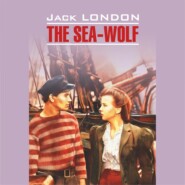По всем вопросам обращайтесь на: info@litportal.ru
(©) 2003-2025.
✖
Brown Wolf and Other Jack London Stories
Настройки чтения
Размер шрифта
Высота строк
Поля
She clapped her hands in the way that tore so delightfully to his heart, and her eyes were dancing, as she exclaimed:
"A Texas cowboy! I always wanted to see one! I heard papa say once that cowboys are bow-legged. Are you?"
"I sure was a Texas cowboy," he answered. "But it was a long time ago. And I'm sure bow-legged. You see, you can't ride much when you're young and soft without getting the legs bent some. Why, I was only a three-year-old when I begun. He was a three-year-old, too, fresh-broken. I led him up alongside the fence, dumb to the top rail, and dropped on. He was a pinto, and a real devil at bucking, but I could do anything with him. I reckon he knowed I was only a little shaver. Some hosses knows lots more 'n' you think."
For half an hour Ross Shanklin rambled on with his horse reminiscences, never unconscious for a moment of the supreme joy that was his through the touch of his hand on the hem of her dress. The sun dropped slowly into the cloud bank, the quail called more insistently, and empty wagon after empty wagon rumbled back across the bridge. Then came a woman's voice.
"Joan! Joan!" it called. "Where are you, dear?"
The little girl answered, and Ross Shanklin saw a woman, clad in a soft, clinging gown, come through the gate from the bungalow. She was a slender, graceful woman, and to his charmed eyes she seemed rather to float along than walk like ordinary flesh and blood.
"What have you been doing all afternoon?" the woman asked, as she came up.
"Talking, mamma," the little girl replied. "I've had a very interesting time."
Ross Shanklin scrambled to his feet and stood watchfully and awkwardly. The little girl took the mother's hand, and she, in turn, looked at him frankly and pleasantly, with a recognition of his humanness that was a new thing to him. In his mind ran the thought: the woman who ain't afraid. Not a hint was there of the timidity he was accustomed to seeing in women's eyes. And he was quite aware, and never more so, of his bleary-eyed, forbidding appearance.
"How do you do?" she greeted him sweetly and naturally.
"How do you do, ma'am," he responded, unpleasantly conscious of the huskiness and rawness of his voice.
"And did you have an interesting time, too!" she smiled.
"Yes, ma'am. I sure did. I was just telling your little girl about hosses."
"He was a cowboy, once, mamma," she cried.
The mother smiled her acknowledgment to him, and looked fondly down at the little girl. The thought that came into Ross Shanklin's mind was the awfulness of the crime if any one should harm either of the wonderful pair. This was followed by the wish that some terrible danger should threaten, so that he could fight, as he well knew how, with all his strength and life, to defend them.
"You'll have to come along, dear," the mother said. "It's growing late." She looked at Ross Shanklin hesitantly. "Would you care to have something to eat?"
"No, ma'am, thanking you kindly just the same. I … I ain't hungry."
"Then say good-bye, Joan," she counselled.
"Good-bye." The little girl held out her hand, and her eyes lighted roguishly. "Good-bye, Mr. Man from the bad, wicked world."
To him, the touch of her hand as he pressed it in his was the capstone of the whole adventure.
"Good-bye, little fairy," he mumbled. "I reckon I got to be pullin' along."
But he did not pull along. He stood staring after his vision until it vanished through the gate. The day seemed suddenly empty. He looked about him irresolutely, then climbed the fence, crossed the bridge, and slouched along the road. He was in a dream. He did not note his feet nor the way they led him. At times he stumbled in the dust-filled ruts.
A mile farther on, he aroused at the crossroads. Before him stood the saloon. He came to a stop and stared at it, licking his lips. He sank his hand into his pants pocket and fumbled a solitary dime. "God!" he muttered. "God!" Then, with dragging, reluctant feet, went on along the road.
He came to a big farm. He knew it must be big, because of the bigness of the house and the size and number of the barns and outbuildings. On the porch, in shirt sleeves, smoking a cigar, keen-eyed and middle-aged, was the farmer.
"What's the chance for a job!" Ross Shanklin asked.
The keen eyes scarcely glanced at him.
"A dollar a day and grub," was the answer.
Ross Shanklin swallowed and braced himself.
"I'll pick grapes all right, or anything. But what's the chance for a steady job? You've got a big ranch here. I know hosses. I was born on one. I can drive team, ride, plough, break, do anything that anybody ever done with hosses."
The other looked him over with an appraising, incredulous eye.
"You don't look it," was the judgment.
"I know I don't. Give me a chance. That's all. I'll prove it."
The farmer considered, casting an anxious glance at the cloud bank into which the sun had sunk.
"I'm short a teamster, and I'll give you the chance to make good. Go and get supper with the hands."
Ross Shanklin's voice was very husky, and he spoke with an effort.
"All right. I'll make good. Where can I get a drink of water and wash up?"
"JUST MEAT"
He strolled to the corner and glanced up and down the intersecting street, but saw nothing save the oases of light shed by the street lamps at the successive crossings. Then he strolled back the way he had come. He was a shadow of a man sliding noiselessly and without undue movement through the semi darkness. Also he was very alert, like a wild animal in the jungle, keenly perceptive and receptive. The movement of another in the darkness about him would need to have been more shadowy than he to have escaped him.
In addition to the running advertisement of the state of affairs carried to him by his senses, he had a subtler perception, a feel, of the atmosphere around him. He knew that the house in front of which he paused for a moment, contained children. Yet by no willed effort of perception did he have this knowledge. For that matter, he was not even aware that he knew, so occult was the impression. Yet, did a moment arise in which action, in relation to that house, were imperative, he would have acted on the assumption that it contained children. He was not aware of all that he knew about the neighborhood.
In the same way, he knew not how, he knew that no danger threatened in the footfalls that came up the cross street. Before he saw the walker, he knew him for a belated pedestrian hurrying home. The walker came into view at the crossing and disappeared on up the street. The man that watched, noted a light that flared up in the window of a house on the corner, and as it died down he knew it for an expiring match. This was conscious identification of familiar phenomena, and through his mind flitted the thought, "Wanted to know what time." In another house one room was lighted. The light burned dimly and steadily, and he had the feel that it was a sick room.
He was especially interested in a house across the street in the middle of the block. To this house he paid most attention. No matter what way he looked, nor what way he walked, his looks and his steps always returned to it. Except for an open window above the porch, there was nothing unusual about the house. Nothing came in nor out. Nothing happened. There were no lighted windows, nor had lights appeared and disappeared in any of the windows. Yet it was the central point of his consideration. He rallied to it each time after a divination of the state of the neighborhood.
Despite his feel of things, he was not confident. He was supremely conscious of the precariousness of his situation. Though unperturbed by the footfalls of the chance pedestrian, he was as keyed up and sensitive and ready to be startled as any timorous deer. He was aware of the possibility of other intelligences prowling about in the darkness – intelligences similar to his own in movement, perception, and divination.
Far down the street he caught a glimpse of something that moved. And he knew it was no late home-goer, but menace and danger. He whistled twice to the house across the street, then faded away shadow-like to the corner and around the corner. Here he paused and looked about him carefully. Reassured, he peered back around the corner and studied the object that moved and that was coming nearer. He had divined aright. It was a policeman.
The man went down the cross street to the next corner, from the shelter of which he watched the corner he had just left. He saw the policeman pass by, going straight on up the street. He paralleled the policeman's course, and from the next corner again watched him go by; then he returned the way he had come. He whistled once to the house across the street, and after a time whistled once again. There was reassurance in the whistle, just as there had been warning in the previous double whistle.
He saw a dark bulk outline itself on the roof of the porch and slowly descend a pillar. Then it came down the steps, passed through the small iron gate, and went down the sidewalk, taking on the form of a man. He that watched kept on his own side the street and moved on abreast to the corner, where he crossed over and joined the other. He was quite small alongside the man he accosted.
"How'd you make out, Matt?" he asked.
The other grunted indistinctly, and walked on in silence a few steps.
"I reckon I landed the goods," he said.
Jim chuckled in the darkness, and waited for further information. The blocks passed by; under their feet, and he grew impatient.
"Well, how about them goods?" he asked. "What kind of a haul did you make, anyway?"

















